Thirty-six Views of Mount Fuji
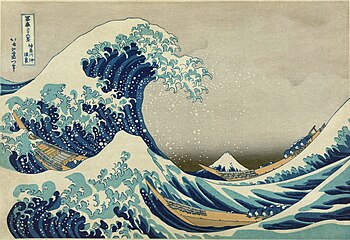
Thirty-six Views of Mount Fuji (Japanese: 富嶽三十六景, Hepburn: Fugaku Sanjūrokkei) is a series of landscape prints by the Japanese ukiyo-e artist Hokusai (1760–1849). The series depicts Mount Fuji from different locations and in various seasons and weather conditions. The immediate success of the publication led to another ten prints being added to the series.
The series was produced from c. 1830 to 1832, when Hokusai was in his seventies and at the height of his career, and published by Nishimura Yohachi.[1][2] Among the prints are three of Hokusai's most famous: The Great Wave off Kanagawa, Fine Wind, Clear Morning, and Thunderstorm Beneath the Summit.[1] The lesser-known Kajikazawa in Kai Province is also considered one of the series' best works.[3] The Thirty-six Views has been described as the artist's "indisputable colour-print masterpiece".[2]
History
[edit]Mount Fuji is a popular subject for Japanese art due to its cultural and religious significance. This belief can be traced to The Tale of the Bamboo Cutter, where a goddess deposits the elixir of life on the peak. As the historian Henry Smith[4] explains, "Thus from an early time, Mt. Fuji was seen as the source of the secret of immortality, a tradition that was at the heart of Hokusai's own obsession with the mountain."[5]
Each image was made through a process whereby Hokusai's drawing on paper was glued to a woodblock to guide the carving. The original design is therefore lost in the process. The block was then covered with ink and applied to paper to create the image (see Woodblock printing in Japan for further details). The complexity of Hokusai's images includes the wide range of colors he used, which required the use of a separate block for each color appearing in the image.
The earliest prints in the series were made with largely blue tones (aizuri-e), including the key blocks which provide an image's outlines.[2] Prussian blue pigment had not long been introduced to Japan from Europe and Hokusai used it extensively, ensuring its popularity. Once the publisher, Nishimura, was sure of the series' success, prints were made with multiple colours (nishiki-e). Nishimura had planned to expand the series to more than a hundred prints, but publication stopped at forty-six.[6]
The most famous single image from the series is widely known in English as The Great Wave off Kanagawa. It is Hokusai's most celebrated work and is often considered the most recognizable work of Japanese art in the world. Another iconic work from Thirty-six Views is Fine Wind, Clear Morning, also known as Red Fuji, which has been described as "one of the simplest and at the same time one of the most outstanding of all Japanese prints".[7]
Influence
[edit]While Hokusai's Thirty-six Views of Mount Fuji is the most famous ukiyo-e series to focus on Mount Fuji, there are several other works with the same subject, including Hiroshige's later series Thirty-six Views of Mount Fuji and Hokusai's subsequent book One Hundred Views of Mount Fuji (published 1834–1835).[5]
In his 1896 book on Hokusai, French art critic Edmond de Goncourt wrote that despite its "rather crude colors", it was, "the album which inspires the landscapes of the impressionists of the present moment."[2] The French artist Henri Rivière (1864–1951) published the set of color lithographs "Thirty-six views of the Tour Eiffel" in 1902, inspired by the seminal print set of Hokusai, one of the many influences of Japanese art on late 19th century and early 20th century French art (Japonism, known as "Japonisme" in French)
Prints
[edit]Original thirty-six
[edit]| No. | Image | English title | Japanese title |
|---|---|---|---|
| 1 |  |
The Great Wave off Kanagawa | 神奈川沖浪裏
Kanagawa oki nami-ura |
| 2 |  |
Fine Wind, Clear Morning, also known as South Wind, Clear Sky or Red Fuji | 凱風快晴
Gaifū kaisei |
| 3 |  |
Thunderstorm Beneath the Summit | 山下白雨
Sanka hakuu |
| 4 |  |
Under Mannen Bridge at Fukagawa | 深川万年橋下
Fukagawa Mannen-bashi shita |
| 5 |  |
Sundai, Edo | 東都駿台
Tōto Sundai |
| 6 |  |
The Cushion Pine at Aoyama | 青山円座松
Aoyama Enza-no-matsu |
| 7 |  |
Senju in Musashi Province | 武州千住
Bushū Senju |
| 8 | 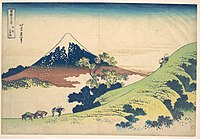 |
Inume Pass in Kai Province | 甲州犬目峠
Kōshū Inume-tōge |
| 9 |  |
Fujimi Field in Owari Province | 尾州不二見原
Bishū Fujimigahara |
| 10 |  |
Ejiri in Suruga Province | 駿州江尻
Sunshū Ejiri |
| 11 |  |
A sketch of the Mitsui shop in Suruga in Edo (present-day Muromachi, Tokyo) | 江都駿河町三井見世略図
Kōto Suruga-cho Mitsui-mise ryakuzu |
| 12 |  |
Sunset across Ryōgoku Bridge from Ommayagashi (present-day Kuramae, Taitō, Tokyo) | 御厩川岸より両国橋夕陽見
Ommayagashi yori Ryōgoku-bashi yūhi-mi |
| 13 |  |
Sazaidō at Gohyakurakan Temple | 五百らかん寺さざゐどう
Gohyakurakan-ji Sazaidō |
| 14 |  |
Morning after a snowfall at Koishikawa | 礫川雪の旦
Koishikawa yuki no ashita |
| 15 |  |
Shimomeguro | 下目黒
Shimomeguro |
| 16 |  |
Watermill at Onden | 隠田の水車
Onden no suisha |
| 17 |  |
Enoshima in Sagami Province | 相州江の島
Soshū Enoshima |
| 18 |  |
Sketch of Tago Bay, Ejiri along the Tōkaidō | 東海道江尻田子の浦略図
Tōkaidō Ejiri Tago-no-ura ryakuzu |
| 19 |  |
Yoshida along the Tōkaidō | 東海道吉田
Tōkaidō Yoshida |
| 20 |  |
Kazusa Province sea route | 上総の海路
Kazusa no kairo |
| 21 | 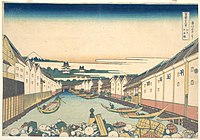 |
Nihonbashi in Edo | 江戸日本橋
Edo Nihonbashi |
| 22 |  |
Sekiya village on the Sumida River (near present-day Keisei Sekiya Station) | 隅田川関屋の里
Sumida-gawa Sekiya-no-sato |
| 23 |  |
Noboto Bay (present-day Chūō-ku, Chiba) | 登戸浦
Noboto-ura |
| 24 |  |
Hakone Lake in Sagami Province | 相州箱根湖水
Sōshū Hakone-kosui |
| 25 |  |
Reflection from Misaka Pass in Kai Province (in Lake Kawaguchi) | 甲州三坂水面
Kōshū Misaka suimen |
| 26 |  |
Hodogaya along the Tōkaidō | 東海道保土ケ谷
Tōkaidō Hodogaya |
| 27 |  |
Tama River in Musashi Province | 武州玉川
Bushū Tama-gawa |
| 28 |  |
Asakusa Hongan Temple in Edo | 東都浅草本願寺
Tōto Asakusa Hongan-ji |
| 29 |  |
Tsukuda Island in Edo | 武陽佃島
Buyō Tsukuda-jima |
| 30 |  |
Shichirigahama in Sagami Province | 相州七里浜
Soshū Shichirigahama |
| 31 |  |
Umezawa in Sagami Province (near present-day Ninomiya, Kanagawa) | 相州梅沢庄
Soshū Umezawa-no-shō |
| 32 |  |
Kajikazawa in Kai Province | 甲州石班沢
Kōshū Kajikazawa |
| 33 |  |
Mishima Pass in Kai Province (near present-day Kagosaka Pass) | 甲州三嶌越
Kōshū Mishima-goe |
| 34 |  |
In the mountains of Tōtōmi Province | 遠江山中
Tōtōmi san-chū |
| 35 |  |
A View of Mount Fuji Across Lake Suwa (Lake Suwa in Shinano Province) | 信州諏訪湖
Shinshū Suwa-ko |
| 36 |  |
Ushibori in Hitachi Province (present-day Itako, Ibaraki) | 常州牛堀
Jōshū Ushibori |
Additional 10
[edit]| No. | Image | English title | Japanese title |
|---|---|---|---|
| 1 |  |
Goten-yama-hill, Shinagawa on the Tōkaidō | 東海道品川御殿山の不二
Tōkaidō Shinagawa Goten'yama no Fuji |
| 2 |  |
Honjo Tatekawa, the timberyard at Honjo, Sumida | 本所立川
Honjo Tatekawa |
| 3 |  |
Pleasure District at Senju | 従千住花街眺望の不二
Senju Hana-machi Yori Chōbō no Fuji |
| 4 |  |
Nakahara in Sagami Province | 相州仲原
Sōshū Nakahara |
| 5 |  |
Ōno Shinden in Suruga Province | 駿州大野新田
Sunshū Ōno-shinden |
| 6 | 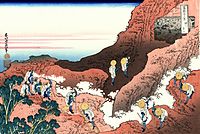 |
Climbing on Fuji | 諸人登山
Shojin tozan |
| 7 | 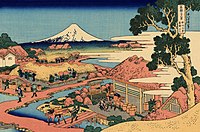 |
The Tea plantation of Katakura in Suruga Province | 駿州片倉茶園の不二
Sunshū Katakura chaen no Fuji |
| 8 |  |
The Fuji from Kanaya on the Tōkaidō | 東海道金谷の不二
Tōkaidō Kanaya no Fuji |
| 9 |  |
Dawn at Isawa in Kai Province | 甲州伊沢暁
Kōshū Isawa no Akatsuki |
| 10 |  |
The back of Fuji from the Minobu river | 身延川裏不二
Minobu-gawa ura Fuji |
Exhibitions
[edit]A collection of Thirty-six Views of Mount Fuji prints contained in the wellness spa of the Costa Concordia was lost during the collision of the ship on January 13, 2012.[8]
All forty-six prints (the original thirty-six plus the ten additions) were featured in the exhibition Hokusai: 36 Views of Mount Fuji at the Freer Gallery of Art and the Arthur M. Sackler Gallery, the Smithsonian's museums of Asian art, in the spring of 2012.
The Thirty-six Views of Mount Fuji prints were displayed at the Museum of Fine Arts, Boston as part of a Hokusai exhibit April 5 through August 9, 2015.[9]
The Thirty-six Views of Mount Fuji prints were displayed at the National Gallery of Victoria, Melbourne, Australia as part of a Hokusai exhibit 21 July through 22 October 2017, featuring two copies of The Great Wave off Kanagawa, one from the NGV and one from Japan Ukiyo-e Museum.[10]
There are fewer than 10 complete sets of the Thirty-six Views of Mount Fuji, with prominent pieces held at the Metropolitan Museum of Art, MFA Boston, the British Museum, and the Bibliothèque nationale de France.[11]
Markets
[edit]Thirty-six Views of Mount Fuji is often sold in prominent auction houses focused on Japanese art, such as that of Christie's, Sotheby's, Bonhams, etc.[11]
In 2002, a complete set sold at Sotheby's went for $1.47 million, through an anonymous buyer.[11]
In 2013, another complete set was assembled by Dr. Jintendra V. Singh, a professor from Wharton School, who was inspired by Mt. Fuji from seeing the mountain on flights to Japan as well as his previous Hindu pilgrimages to Mount Everest and Mount Kailash. He purchased Fuji Seen From Kanaya on the Tokaido first, with the iconic pieces acquired from 2014 to 2016, the final print was acquired in January 2023.[11]
On 19 March 2024, the Singh collection went onto auction at Christie's, which then sold for $3.559 million from an estimated bid of $3–5 million. The proceeds has gone into Singh's trust.[11][12][13]
See also
[edit]Notes
[edit]- ^ a b Calza, p. 30
- ^ a b c d Calza, p. 470
- ^ Calza, p. 472
- ^ Smith, Henry (1988). One Hundred Views of Mount Fuji. Thames and Hudson. ISBN 9780500235188.
- ^ a b Smith
- ^ Calza, p. 230
- ^ Calza, p. 471
- ^ "Costa Concordia: Threat of treasure hunters". To Be A Travel Agent.
- ^ "Hokusai Features Legendary Artist, Best Known for Iconic Great Wave".
- ^ "Hokusai".
- ^ a b c d e Fabrikant, Geraldine (2024-03-18). "One Collector's High Mountain Road to Hokusai". The New York Times. Archived from the original on 2024-03-18. Retrieved 2024-03-21.
- ^ "LIVE AUCTION 22643 - JAPANESE AND KOREAN ART Lot 135: Fugaku sanjurokkei (Thirty-six views of Mount Fuji)". Christie's. March 2024. Retrieved 21 March 2024.
- ^ "Hokusai's rare Mt. Fuji collection sold for $3.6 mil. at N.Y. auction". Kyodo News+. Retrieved 2024-03-21.
References
[edit]- Balcou, Amelie (2019). "Hokusai: Thirty-Six Views of Mount Fuji". Prestel. ISBN 978-3791386072.
- Calza, Gian Carlo (2003). Hokusai. Phaidon. ISBN 0714844578.
- Marks, Andreas (2021). "Thirty-six Views of Mount Fuji". New York: Taschen. ISBN 978-3836575720.
- Nagata, Seiji (1999). Hokusai: Genius of the Japanese Ukiyo-e. Tokyo: Kodansha.
- Price, Jonathan Reeve (2020). "Viewing Hokusai Viewing Mount Fuji". Albuquerque, New Mexico: Communication Circle. ISBN 978-0-9719954-7-5.
- Smith, Henry D. II (1988). Hokusai: One Hundred Views of Mt. Fuji. New York: George Braziller, Inc., Publishers. ISBN 0-8076-1195-6.
- Thompson, Sarah (2019). "Hokusai's Landscapes: The Complete Series". Boston: MFA Publications. ISBN 978-0878468669.
- Zelazny, Roger (1985). "24 Views of Mount Fuji". In Cthulu 2000: Stories (1995). Sauk City, WI: Arkham House. ISBN 978-0345422033.
